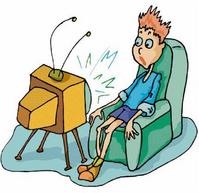
OVER AND over again, I have explained to readers of this column that most of our common health problems are simply a result of our unhealthy lifestyles. I contend that what we need is not more doctors, more drugs or more hospitals. Rather, we need much more to educate and motivate our people, especially our children, to adopt healthier habits. Let us stop paying mere lip service to prevention.
Here is another issue we need to deal with - how much television do we and our children watch? Television can be a wonderful learning tool. Over 40 years ago, Sesame Street helped children learn to read, count and socialise. Today, there are wonderful nature programmes on television that help us to respect the wider world and the many creatures that inhabit it.
But there is a dark side to TV. The average child in the United States watches about four hours of television a day and each year views tens of thousands of commercials, often for high-fat, high-sugar or high-salt snacks and foods. They watch thousands of episodes of violence and countless instances of drug abuse and inappropriate sexual activity. By the time most American children finish high school, they have spent nearly twice as many hours in front of the television set as in the classroom. I fear that the Jamaican child is heading in the same direction.
Although the experts still debate the precise ill effects of excessive television watching on children, there are some undeniable facts, many documented through scientific research.
OBESE KIDS
Children watching TV are sitting still, using the fewest calories of any activity except sleeping. Such children get less exercise than those who watch less television, and they see many more commercials for unhealthy foods and drinks. They also tend to consume such foods more than the children who are outside playing.
It is no surprise, then, that we are now facing an epidemic of childhood obesity. One expert, Dr. William H. Dietz of the Centers for Disease Control and Prevention, believes that TV-watching reduction may be the most effective measure in reducing weight gain in kids.
DAMAGED BRAINS
Research on brain function shows evidence of direct harm to the brains of young children who watch television for two or more hours a day. Watching television fosters development of brain circuits, or 'mental habits' that result in increased aggressiveness, lower tolerance levels and decreased attention span. At the same time, there is a reduction in development of the language circuits in the brain.
Studies have found that children who watch 10 or more hours of TV a week have lower reading scores and perform worse academically when compared to youngsters who spend less time watching television.
Dr. Jane M. Healy, an educational psychologist, reported to the American Academy of Pediatrics that many parents of children diagnosed with attention-deficit disorder found the difficulty markedly improved after they took away their children's television viewing privileges.
OVERSTIMULATED BRAINS

According to Dr. Dimitri Christakis, at the Children's Hospital in Seattle, watching TV can cause the developing mind to experience unnatural levels of stimulation and children who are exposed to the unrealistic levels of stimulation at a young age continue to expect this in later life. This leads to difficulty dealing with the slower pace of school and homework. This, he says, is made worse by the rapid image change that television programme makers deliberately use to keep young children interested. His research shows that each hour in front of the TV increased a child's chances of attention deficit disorder by 10 per cent.
"Television may be one of the most damaging forces in a child's life, causing the child to perceive the world in a different way. TV presents a view of the world that is fragmented and transitory. Stories and films move from cut to cut, scene to scene and present an unrealistic timeline of action, emotions and events. The child simply observes and feels all this and finds it difficult to separate this projection of life from their own reality. When the TV stops, the stimulation stops and they are left with a sense that life has stopped and that there is something missing."
OTHER PROBLEMS
Other problems associated with excessive television viewing are poor sleep and a greater likelihood of taking up smoking. A study at the Center for Child Health Outcomes in San Diego found that children aged 10 to 15 who watched five or more hours of television a day were six times as likely to start smoking as those who watched less than two hours a day.
RECOMMENDATIONS
Start by setting limits and household rules. Decide how many hours (one or two at the most), and when, your child can watch television each day. Rather than saying, "You can't watch TV," try, "Let's turn off the television so we can read a book, take a bike ride, play with your friend." Once you have set the limit, stick to it.
Don't use the TV as a reward or punishment. That only increases its value in your child's mind. Plan your child's viewing by using a programme guide and ratings to select the shows, and turn the TV off when the chosen show is over. Do not let your child watch television during meals or while doing homework. If a favourite programme is on, then tape it for later.
Whenever possible, watch TV with your children and talk about what you see. Make sure young children know that TV characters are not real. Do not let them watch cartoons, programmes or newscasts that depict violence or sexual activity. Explain that commercials are designed to make people want things they may not need.
Set a good example by limiting your own TV viewing. Consider setting aside one day a week as a 'no TV' day.
Email Dr. Tony Vendryes at vendryes@mac.com, log on to www.anounceofprevention.org or listen to 'An Ounce of Prevention' on Power 106FMon Fridays and Saturdays at 8:00 p.m.

